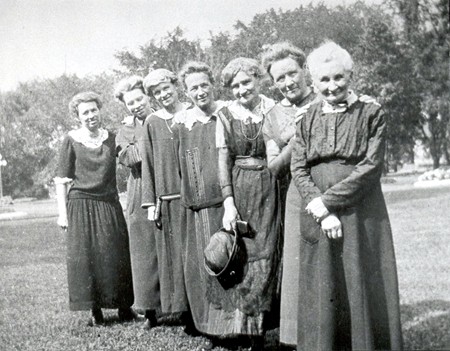
Frances Flatters and six of her daughters
The Bourne woman
who became a pioneer
in the New World
by REX NEEDLE
|
The colonies during the 19th century offered the chance for young people to better themselves in a new country and accounts of such successes that were brought back to Bourne spurred many on to make this drastic change in their circumstances and to seek their fortunes in faraway places. We hear many tales of the men who made the journey but the women are too frequently forgotten yet without them families would not have survived or communities thrived and it was frequently their courage and devotion that became a driving force for good in the New World. One such woman who made the perilous sea voyage across the Atlantic for a step into the unknown was Frances Harriet Hester, then aged 21, of Hanthorpe village near Bourne. She was married to a local man, Joseph Tye Flatters, who worked as a photographer. He was also well known in the town as a bell-ringer at the Abbey Church and for playing the trumpet with the town band as well as serving with the Lincolnshire Rifle Volunteers, a part time military unit based in Bourne. Joseph had started his working life as a shop assistant with the grocery and drapery business Rodgers & Hester which was located in the market place on a site now occupied by the National Westminster Bank. The business also included a photography service, then in its infancy, in which he specialised and soon after marrying Frances, the boss’s daughter, in 1865, he branched out on his own from rented premises in North Street. But Joseph was an adventurous spirit and after reading many tales in the newspapers about the men who had emigrated and made their fortunes, he decided to follow and despite having a large family, sailed aboard the SS Scandinavian, a steamship with sailing masts, which departed from Liverpool on 19th May 1871, arriving in Quebec the following July with his wife and their four young children, sons Joseph, James and William and daughter Nellie. Twins had also been born to Frances in England before they left but both had died before they emigrated and she was to have eight more children in Canada, although one, a baby girl called Fannie Lewella, died soon after Christmas in 1882, six weeks before her second birthday. The couple settled at Aylmer, Quebec, six miles up the Outaouais or Ottawa River from Ottawa, the Canadian capital, a river that played an important role in the country's fur trade and lumber industry and in opening up the Canadian west. Joseph became a sheriff and court bailiff, travelling the district on horseback and by horse and buggy, switching to a horse and sleigh when the snows came during the winter months, but soon discovered that his new job could be a very dangerous one indeed. In June 1885 he stopped a young lad, Daniel Ardell, aged 14, for questioning in the matter of a stolen watch. The boy had a gun, panicked and shot Joseph in the hip. The bullet lodged deep in the flesh and doctors were unable to extract it and he died two weeks later on 1st July 1885. He was 43 years old and had been in Canada for only fourteen years. Ardell was tried and sentenced to fourteen years in prison but served only seven and when released and reputedly reformed, he became a preacher and spent the rest of his life in the western provinces of Canada. The killing left Joseph's widow, Frances, in difficult circumstances and although the two eldest boys, John and William, were already working, she had her other children still to support, among them three-months-old Josephine, the latest addition to the family who had arrived on 20th March 1885. But Joseph had been a careful man and he wrote in his diary for the year 1879 that he had taken out an insurance policy on his life for $1,000 and so his family would not have been left penniless and the town council also voted to pay Joseph's widow his entire year's salary of $400 that he would have received had he lived. Frances lived to be 84 and died at Aylmer on 31st August 1928, but not before she had returned to England for a visit in 1906, sailing from Quebec aboard the steamer Empress of Ireland, her first time home since she had left for a life in the unknown 35 years before. Today, her extended family is a large one and spread throughout North America. Joseph and Hester had 33 grandchildren and, at the latest count, more than 60 great grandchildren, all living in various parts including Aylmer, Ottawa, Quebec, Halifax, Montreal and Toronto in Canada and Ohio, West Virginia and Texas in the United States. Most notable of them is Hester’s great granddaughter, Mrs Ethel Guertin, who is still alive and living at Gatineau, Quebec, at the age of 98 and has told me this stirring tale of Joseph and Hester who helped bring stability to a small and then untamed part of the North American wilderness and how her grandmother when left with a large family and little else but hope to bring them up showed true pioneering spirit to smooth the path for their survival. Meanwhile, Ethel still manages to keep in touch with the town where her family originated through the Bourne web site and regular emails. “From your photographs and descriptions”, she said, “it does seem to be a lovely place and it is my one regret that I never had the opportunity to visit.” |